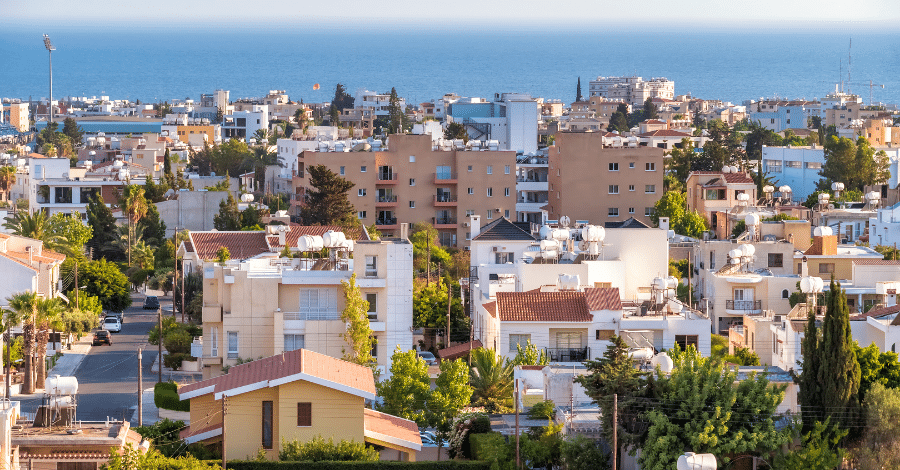Cyprus is a favorite place to retire for people from three continents thanks to its strategic location and the warmest weather in Europe. The Republic of Cyprus, encompassing the southern part of the island, has become home to around 70,000 expatriates, many of them retirees, predominantly from the UK, while also attracting residents from Germany, France, the United States, Canada, and Russia.
This captivating island is the third-largest Mediterranean island after the Italian isles of Sardinia and Sicily, spanning 240 km (150 miles) from east to west and 100 km (62 miles) from north to south. Amidst numerous options for places to live in Cyprus for expats, one question remains:
What are the best places to retire in Cyprus?
Paphos: Year-round golf, sailing and breathtaking sunsets

Positioned on the island’s western coast, Paphos has long held its position as the premier retirement destination in Cyprus. Known for its stunning beaches, picturesque hill villages, and breathtaking mountain vistas, Paphos offers a relaxed lifestyle with a low crime rate, excellent healthcare, and the convenience of an international airport.
The Old Town, locally referred to as ‘Ktima,’ bustles with a vibrant market and various small workshops where one can have a custom-made suit or bespoke shoes within days.

Kato Paphos, the modern part of the town by the coast, features numerous modern villas and apartment buildings, hotels and restaurants, along with a beautiful harbor. Many expats have chosen to settle in sea-view apartments there.

Paphos maintains its appeal throughout the year, offering activities for every season. Nearby are several golf courses, excellent sailing opportunities, and ample hiking routes.

Most expats prefer to reside in the large, popular villages surrounding Paphos, with Peyia being the most favored, closely followed by Tala and Kissonerga. Living in these villages necessitates owning a car for easy mobility.
A rich array of activities awaits in Paphos, including various expat clubs and the Anglican Church, granted use of the exquisite church of Ayia Kyriaki. Numerous animal charities encourage participation, and the dynamic fundraising team of the Cancer Patients Support Group supports PASYKAF Home Nursing.
Limassol: Cosmopolitan vibe, beach life and expat clubs

Limassol emerges as the second most sought-after location for retired expats in Cyprus, a favorite among families and retirees alike. It boasts a range of housing options, from apartments to townhouses and spacious villas for both purchase and rental.

Nestled along the island’s southern coast, Limassol encompasses the historic old town, complete with its castle, and a coastline extending several kilometers, adorned with a picturesque promenade connecting hotels and beaches.
Parks dot the landscape, and nearby lie numerous winemaking villages, just north of Limassol, with the Troodos mountains a mere hour away.
Expats often opt for living in the suburbs, such as Ayios Athanasios to the east, and the Columbia area. On the city’s outskirts lie popular villages like Paraklissia and Moni.
As the island’s primary commercial hub and a thriving holiday resort, Limassol remains active year-round, exuding a cosmopolitan charm that draws expats of diverse nationalities.

Engaging activities abound, from singing groups and amateur drama to charity work. St. Barnabas, Limassol’s Anglican church, boasts a vibrant community with several social groups.
Large villages in the Paphos district: close-knit communities and refreshing weather
Many retirees arriving in Cyprus prefer the charm of a traditional Cypriot village within reach of urban amenities, a delightful balance often coined as ‘the best of both worlds.’ However, a working knowledge of Greek is essential, albeit not the easiest language to master!

The Paphos District, stretching from the west coast to the northwestern coast, offers a captivating blend of rolling hills, picturesque villages, and vineyards.
On low hills overlooking the city, reside villages like Konia, Marathounda, and Armou, home to plenty of expat retirees. Apart from providing traditional village life within a close-knit community, these villages sit just above the humidity line, offering a refreshing escape from sultry August days.

To navigate these areas conveniently, owning a car is essential, given that only two buses make the 20-minute journey on weekdays: one in the morning, taking villagers to the market, and another at lunchtime, returning them home.
Large villages in the Limassol district: communities for artists and history fans
Equally appealing, the Limassol District harbors villages in the rolling countryside leading to the Troodos Mountains. Lania (Laneia), a charming village often referred to as ‘the village of the artists,’ sees several expats calling it home, with their studios bustling with visitors throughout the year.

On the lower mountain slopes stands Agros, known for its rose water. Platres serves as the primary mountain resort, once a preferred holiday spot for the British Army serving in Egypt, seeking the mountain air. While summers in Platres get busy, village life during winter becomes more challenging due to its location on the snowline.

West of Limassol, several large villages, like Kolossi, with its famous castle and rich history of Crusader knights, and Erimi, the island’s first winemaking locale, continue to attract retiring expats. The latter now features a significant expat community residing in a diverse range of villas and townhouses.
Smaller villages: Quiet, character and wine making
The enchanting smaller villages, where time seems to stand still, offer a unique setting for your retirement years in Cyprus. Many houses sport traditional stone-built architecture, full of character, although less comfortable during colder weather. Signal strength for mobiles and Wi-Fi can also vary.

In the Paphos District, wine-making villages like Kathikas and Stroumbi capture hearts with their scenic surroundings, encircled by vineyards. During the grape harvest, everyone lends a hand, fostering a sense of community.
Life in these villages revolves around their Orthodox churches and village tavernas. Most villagers grow their own vegetables and fruit, as the journey into Paphos takes approximately 30 minutes.
Along the Chrysochou Valley between Paphos and Polis Chrysochou, several other villages beckon, including Panayia, Choulou, and the twin villages of Pano & Kato Akourdalia.
It’s essential to note that, while Cyprus winters are brief, they can be somewhat bleak, prompting many villagers to seek refuge with relatives in larger towns during this period.
Similarly charming, the Limassol District harbors small villages of equal allure, such as Lofou, famous for its wines, and Phini, where local potters craft the renowned red clay pitharia, used for storing wine.

During the summer and autumn grape harvest, Lofou bustles with life, but the cool winter evenings often render the place deserted.
Further east, towards Larnaca, lies a cluster of delightful small villages, including the fishing villages of Zygi and Mazatos, 22 km from Larnaca. In recent years, Mazatos has become increasingly popular, now boasting a permanent expat community of 350 residents.
Retiring in Cyprus off the beaten path
Those in search of a remarkable place to retire in Cyprus often gravitate towards the sea, where the lovely beaches and pleasantly warm waters offer an inviting swim until mid-October.
Along the stretch between Polis Chrysochou on the island’s northwestern coast and the market town of Kato Pyrgos, a host of lesser-known beaches, coupled with charming fishing villages, await discovery by tourists.

Speaking fluent Greek is undeniably advantageous, as is understanding the tranquil nature of these villages during the winter months. However, choosing to settle in Argaka, Pomos, or Kato Pyrgos while embracing the beauty of the changing seasons can prove remarkably rewarding.

